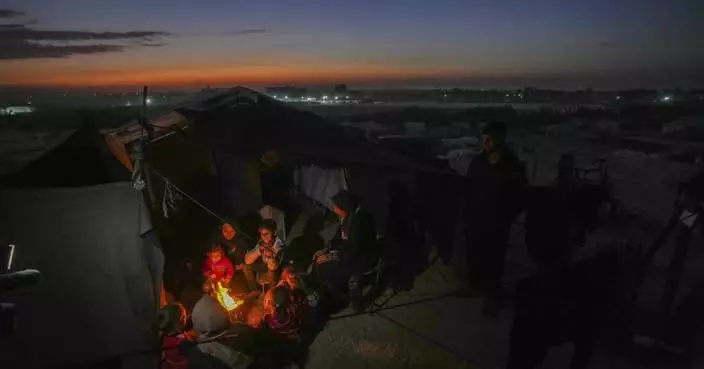HENDERSON, Nev. (AP) — Sunday underscored how much of a week-to-week league the NFL can be with several underdogs pulling off upsets.
None was larger than the Raiders, 8 1/2-point underdogs, rallying from 10 points down in the fourth quarter to defeat the Ravens 26-23.
And now the 0-2 Carolina Panthers, who are making a quarterback change, come to town. This time, Las Vegas (1-1) is a 5 1/2-point favorite, according to BetMGM Sportsbook, and the onus is on the Raiders to not overlook a desperate opponent in a potential trap game.
If coach Antonio Pierce's comments Monday were any indication, that shouldn't be a problem.
“We've got a lot of things that we need to correct,” he said. “It was a win yesterday, but there were a lot of things in that first quarter that were ugly, in that first half that were ugly and in that third quarter that were ugly. We're not worried about the Panthers. We've got to fix the Raiders.”
Pierce is right. It was an impressive fourth quarter, but he knows the Raiders can't rely on such rallies to overcome a number of deficiencies that include a running game that still hasn't gotten started and a conversative offensive game plan that finally opened up in the fourth.
Given the Raiders' talent at the skill positions, opening with a more wide-open game plan should be easier to correct. Whether they have what they need in the running game is uncertain.
But if both areas don't get fixed, what the Raiders accomplished Sunday likely is not sustainable.
“Fourth quarter," Pierce said, "is what it needs to look like for all four quarters."
The Raiders haven't had a no-doubt-about-it successful first-round pick since taking running back Josh Jacobs in 2019. It looks as if tight end Brock Bowers has broken that skid.
He followed his six-catch, 58-yard debut against the Chargers by hauling in nine passes for 98 yards at Baltimore. No rookie has had a better start to his Raiders career than Bowers, whose 15 receptions are better than Amari Cooper's 12 in 2015.
The Raiders have had no success running the ball. Entering Monday, they rank last in the NFL in yards rushing per game (49.0) and per carry (2.51). It would be easy to blame Zamir White, who in taking over for Jacobs — who signed with the Packers — and has rushed for 68 yards on 3.1 per carry through two games.
But to lay it all on White is short-sighted given the offensive line has given him — and the other running backs — almost no room to run.
“It isn’t Zamir,” Pierce said. "We've got to start up front. The big boys up front got to block. Bottom line. They know it. We are going to talk about it here in a few minutes.”
Here's an idea: Keep throwing Davante Adams the ball. That's exactly what Gardner Minshew did Sunday and it's a major reason the Raiders won. Adams caught nine passes for 110 yards and the tying touchdown with 3:54 left, which he set up by drawing a pass interference penalty that moved the ball to the 1-yard line. In the fourth quarter and the game on the line, Adams caught four passes for 86 yards.
The Raiders had 126 yards and nine first downs in the fourth quarter at Baltimore. They gained 430 yards and had 23 first downs in the other seven periods combined. It goes back to Pierce's point that the Raiders have a lot of issues, especially offensively, that one quality quarter shouldn't overshadow. Part of the issue was the unwillingness of first-year offensive coordinator Luke Getsy to take shots down the the field. He finally did in the fourth quarter, and that needs to be more common.
Linebacker Divine Deablo injured his hip in the fourth quarter and rookie left guard Jackson Powers-Johnson, who first had an undisclosed injury and then an illness, still has not played this season. Pierce said he did not have an update on either player.
49 — The number of consecutive games the Raiders lost when behind at least 10 points in the fourth until Sunday's comeback. Washington with 88 and Houston with 51 have the longest active streaks.
The Raiders play their first home game when the Panthers visit on Sunday.
AP NFL: https://apnews.com/hub/nfl

Las Vegas Raiders quarterback Gardner Minshew (15) celebrates after running back Alexander Mattison scored a touchdown against the Baltimore Ravens during the second half of an NFL football game, Sunday, Sept. 15, 2024, in Baltimore. (AP Photo/Stephanie Scarbrough)

Las Vegas Raiders wide receiver Davante Adams, left, catches a touchdown pass against Baltimore Ravens cornerback Marlon Humphrey (44) during the second half of an NFL football game, Sunday, Sept. 15, 2024, in Baltimore. (AP Photo/Stephanie Scarbrough)

Las Vegas Raiders quarterback Gardner Minshew (15) celebrates after the Las Vegas Raiders defeated the Baltimore Ravens in an NFL football game, Sunday, Sept. 15, 2024, in Baltimore. (AP Photo/Stephanie Scarbrough)










